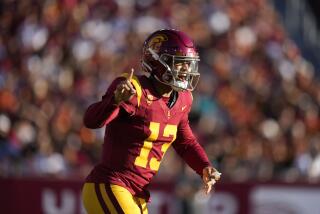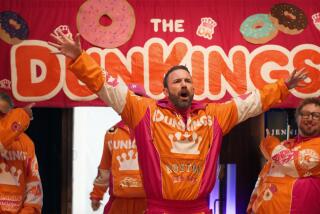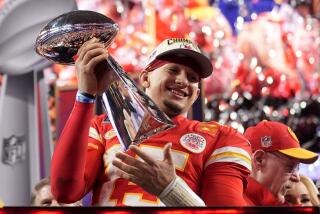For One MVP, Aftermath Is Anything but Super
SAN DIEGO — Bart Starr, Joe Namath, Len Dawson, Roger Staubach, Terry Bradshaw, Jim Plunkett, Joe Montana, Phil Simms . . .
Doug Williams?
It is two days before the Super Bowl, and the ninth quarterback to win the game’s most valuable player award is wondering, what is wrong with this picture?
Wait, he knows.
“You see me anywhere with a milk mustache?” he asks.
Ten years ago in this town, Williams overcame the pain of a root canal, a twisted knee, and countless stereotypes to lead the Washington Redskins to a 42-10 Super Bowl victory over the Denver Broncos.
Williams threw for 340 yards and four touchdowns. He led the team to 35 points in the second quarter alone.
On a day when he was the first black Super Bowl quarterback, he became one of the dead-sure great Super Bowl quarterbacks.
Then he walked off the field and it all changed.
Every receiver was covered. Every linebacker was rushing. There was nowhere to throw and nowhere to run.
No football player is more famous than a Super Bowl hero, and no Super Bowl hero is more famous than a quarterback.
Starr became a coach. Namath a celebrity. Dawson a commentator. Staubach a spokesman. Bradshaw a personality. Plunkett an announcer. Montana a legend. Simms a color man.
Doug Williams missed all that.
He walked off the field to worldwide cheers, then the world became a stranger.
Admit it. When he was recently named coach at his alma mater, Grambling University, replacing Eddie Robinson, it was the first you had heard of Doug Williams in 10 years.
“Everybody knows the endorsements didn’t come for me,” Williams says. “Corporate America just wasn’t ready for it. I don’t have to say that. Just look around.”
Look around, and it is a decade later, and Williams is at a hotel here, and it becomes apparent that this is not the usual homecoming.
Because nothing has changed.
“If things had changed . . . well, look, it’s 1998, and we’re still talking about black coaches,” Williams says.
All week, we’ve been talking.
The Green Bay Packers have a black offensive coordinator, Sherm Lewis, who has experience, a Super Bowl ring, and not one serious head-coaching interview.
The Denver Broncos have a white offensive coordinator, Gary Kubiak, who has little experience, no ring, but is already being rumored for jobs.
It would have been nice if Doug Williams had shown up this week as an example of how far the NFL has come.
Instead, he reminds us of how much opportunity has been lost.
There were as many as six black quarterbacks starting at one time this season in the NFL. But only a few more were on the bench, this in a league where spots exist for 53 guys on each team.
“I think there could be 20-25 black quarterbacks out there,” Williams said.
Two black head coaches were in the playoffs, but there still are only three in the 30-team league.
Doug Williams was right then, and he’s right now.
Corporate America is still not ready for blacks to control the game in which they supply 67% of the talent.
The Super Bowl is the most powerful sports spectacle in this country. But it remains no match for narrow minds.
“I remember watching Terry Bradshaw on TV, and the camera caught Boomer Esiason with his blond hair and blue eyes, and Bradshaw said, ‘That’s just what America loves,’ ” Williams said. “And that’s what it is.”
Paul Tagliabue stood at his lectern Friday and said the league was working on it, but the commissioner is the wrong guy to ask.
Somebody should have turned to those guys standing on the side, those older white men with the dark suits and pasty smiles.
Somebody should ask the part of corporate America that owns the football teams.
“It’s the guys who own the team, they make the decisions,” Williams said. “And nobody can tell them who to hire.”
Just like nobody can tell America what to buy.
And decent Doug Williams, with a background of integrity and the courage of 10 men, could not even sell one of the best games in Super Bowl history.
His favorite story of that year is how, during the season, he was traded to the Los Angeles Raiders.
Because he had been backing up Jay Schroeder at the time, Williams was thrilled.
But six hours after Joe Gibbs had given him the news, the coach changed his mind.
“Doug, I’m selfish, I can’t do it,” Gibbs told him. “I feel, somewhere along the line, you’re going to win this thing for me.”
Being black and a quarterback who had bounced around not only the NFL but the old USFL as well, Williams was the sort of person that few would take a chance on. Yet Gibbs believed.
Amazing what can happen when that happens.
More to Read
Go beyond the scoreboard
Get the latest on L.A.'s teams in the daily Sports Report newsletter.
You may occasionally receive promotional content from the Los Angeles Times.











